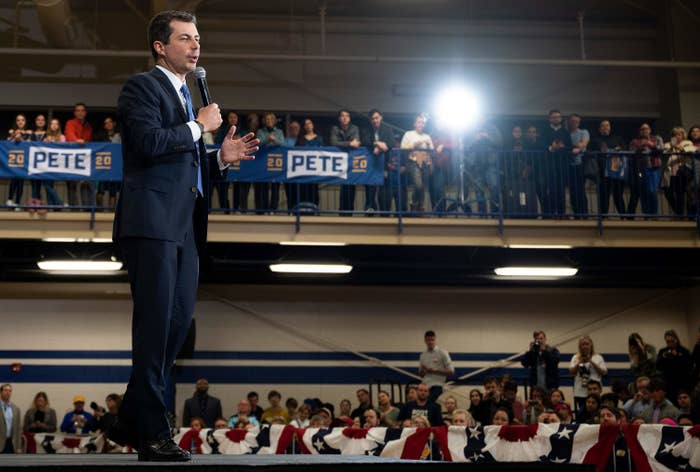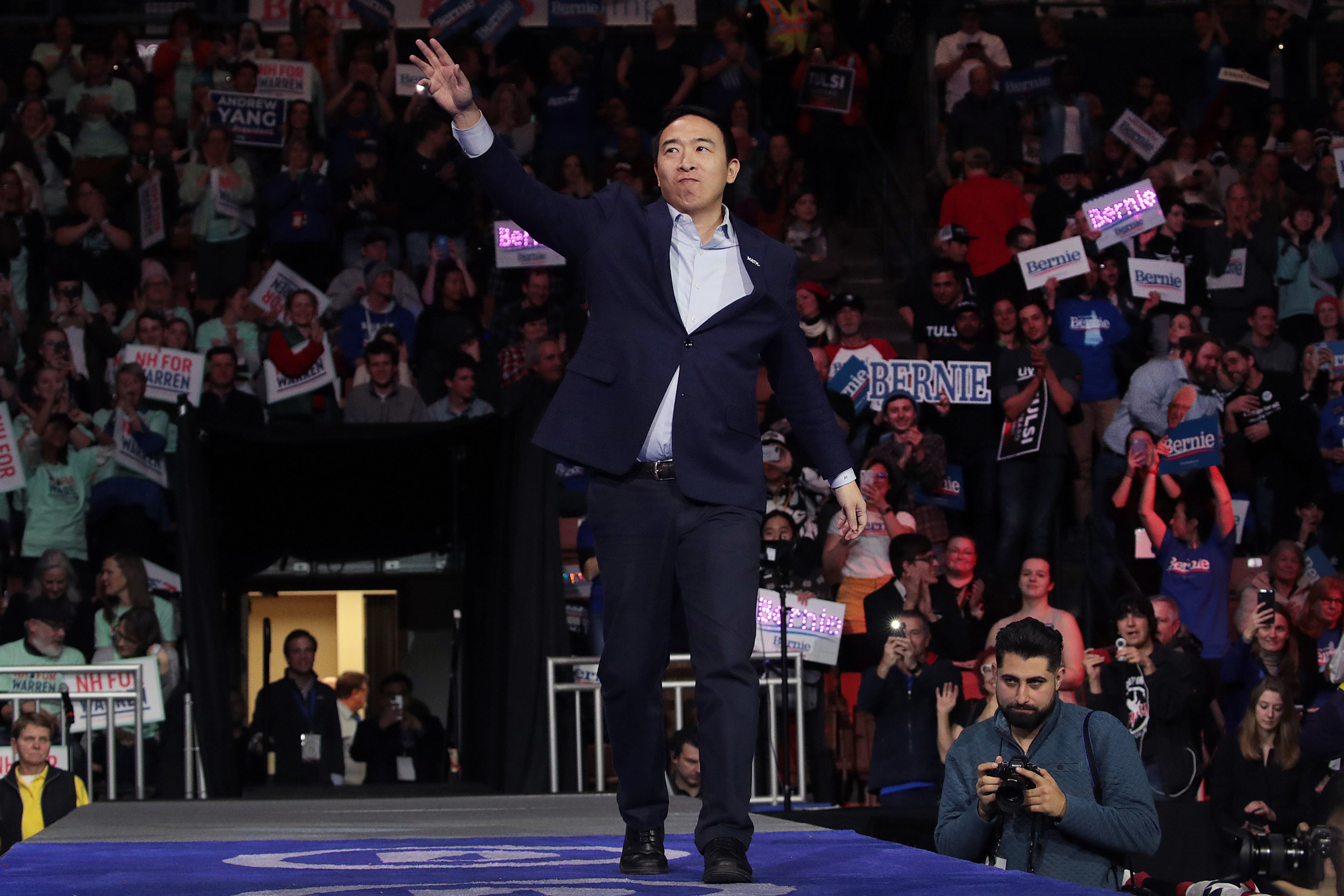
Pete Buttigieg still sees an opportunity to attract Republicans, expand the Democratic Party, and foster a “sense of belonging.” Andrew Yang still believes in universal basic income and thinks a Joe Biden administration would be “tremendously positive” to that end.
And in interviews with BuzzFeed News, they both addressed the challenge of selling the 77-year-old Biden to younger voters worried about crises new and old — the coronavirus, climate change — and looking for more than a transitional leader who isn’t Donald Trump.
The 38-year-old Buttigieg stressed that Democrats must “make that choice up close and personal for those … who are going to be around to deal in the 2050s with the consequences of decisions that were made in the 2020s.” Yang, 45, apologized for leaving future generations “an awful mess.” It’s not their fault, he said, “but we need their help to clean it up.”
Buttigieg, the former mayor of South Bend, Indiana, and Yang, an entrepreneur, were unknown to most of America 18 months ago. But their own campaigns for president this year elevated them as national figures. Buttigieg, the first openly gay candidate to run a major campaign for president, offered a generational message that, despite his youth, resonated with older voters who saw him as a model of how a young leader should carry himself. Yang — one of two Asian Americans in the race along with Sen. Kamala Harris, now Biden’s running mate — cobbled together a coalition of young libertarian- and progressive-minded supporters drawn to his push for a universal basic income (UBI) in the form of $1,000-a-month freedom dividends.
Thursday night, both will be featured in primetime at the Democratic National Convention before Biden formally accepts the party’s nomination for president.
Both spoke with BuzzFeed News by telephone last week to share thoughts on what they learned during their campaigns. They also discussed why they believe Biden, who struggled mightily in the early nominating contests, was able to quickly recover and clear a large field of rivals.
“I think it's the moment that people in South Carolina,” the fourth contest and the first with a majority Black electorate, “got behind Joe in large part because Jim Clyburn endorsed him,” said Yang, drawing a direct line to Biden’s support from the influential lawmaker.
Buttigieg ended his campaign a day after finishing a distant fourth in South Carolina and promptly endorsed Biden. His moderate tone, his struggles to connect with Black voters, and his past work as a business consultant were often the subject of ridicule on social media. Buttigieg reflected on the race by conceding a point that guided Biden’s advisers during the primaries.
“The thing above all I learned that, you know, there's a difference between what you see on Twitter and what you see out there in communities,” Buttigieg said. “People may have strong beliefs but are way more open to other ideas — even to crossing party lines — than you would think, just by following the conversation online and in some of the coverage.”

As a candidate, Buttigieg talked about recruiting “future former Republicans.” When he spoke last week, he saw potential in a Democratic convention that already had booked John Kasich, an anti-Trump Republican and former governor of Ohio, as a primetime speaker. Other prominent Republicans, including Cindy McCain, former New Jersey governor Christine Todd Whitman, and former US secretary of state Colin Powell, were later added to the lineup.
“You know, I talked to so many Republicans, or former Republicans, who are just disgusted with what their party has become,” said Buttigieg, reminiscing about his campaign. “This is, I think, the greatest chance that we have had in my lifetime to welcome them and expand our party.”
The emphasis on Biden-friendly Republicans may have initially come at Yang’s expense. He was not among the originally announced convention speakers and made his displeasure known. Organizers then found him time on Thursday night.
“Uhhhh,” replied Yang, laughing as he drew out the thinking sound when asked if he received an explanation for the snub. “I’m not sure.”
Biden presents his willingness to work with Republicans as a virtue, even in an era when progressives and conservatives have shown little appetite for such bipartisanship. But the framing helped establish his electability argument. It was an argument that Yang — who got an early start meeting Democratic activists across Iowa only to finish a very distant sixth in the nation’s first caucuses — found in retrospect humbling and powerful in Biden’s candidacy.
“When I talked to voters on the trail for months, that was always the overriding concern and voters decided — correctly, I believe,” said Yang, laughing again, “that Joe Biden was the best candidate to defeat Donald Trump. So, that to me explains a lot of the dynamics we see, because it's been on everyone's minds for the last two-plus years that I was campaigning.”
Buttigieg noticed something deeper that would pay off for Biden as the former vice president wrapped up the nomination and a deadly pandemic took hold of the country.
“I think one of the most important things is that his instinct is to heal and not to divide — that just everything about him says that you have a person who cares about bringing people together and cares about improving others' lives,” Buttigieg said. “I'd like to think this could be expected of any candidate, but the truth is, right now it's not a small thing that the president be someone characterized by empathy and compassion. That just shines through in somebody like Joe.”
Buttigieg was still polishing his convention remarks last Friday but said they’d be tied into Thursday night’s theme: "America’s Promise."
“I think the greatest promise in America is that it can be a place where everybody has a sense of belonging,” he said. “It's part of my personal story, it's part of my community story, and certainly part of my campaign story.”

Yang plans to show he’s a team player. “Right now my focus is on helping Joe and Kamala win, because I think that would be tremendously positive for universal basic income and other policy goals,” he asserted.
“So that's what I'm thinking about,” Yang said. “How best I can help?”
One answer, for both Yang and Buttigieg, could be a job in a Biden administration.
Buttigieg noted that “it’s not just the vice president's speech and Sen. Harris's address, but [also] the lineup of Democrats that we're going to see will remind Americans of the leadership team that we could have.” (“I’m not going to measure drapes for one job or another,” Buttigieg, a Navy veteran, responded in a video chat this week when the Washington Post’s Robert Costa asked if he’d be willing to serve as secretary of defense in a Biden Cabinet.)
Yang was more open about his eagerness.
“I ran for president because I'm passionate about addressing some of the problems that I think are growing more powerful by the day,” he told BuzzFeed News. “If Joe and Kamala ask me to help fix those problems, of course I would say yes. You know, I'm not the kind of person that calls out problems and then doesn't want to get my sleeves rolled up and try to help.”
